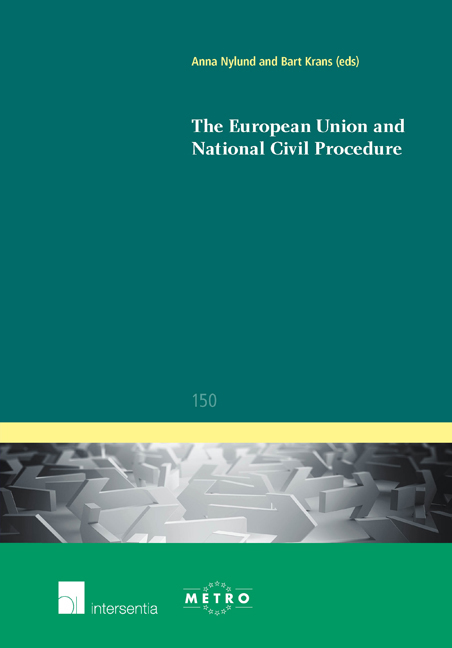Book contents
- Frontmatter
- Contents
- About the Authors
- List of Abbreviations
- The European Union and National Civil Procedure – A Rocky Road or a Smooth Process?
- Some European Challenges for Belgian Civil Procedure
- Danish Civil Procedure and the Internal Market: Impact and Challenges of Sectoral Harmonisation
- European Influences upon English Civil Justice: Tempests or Gentle Breezes?
- European Union and National Civil Procedure: The French Paradox
- The European Union and Civil Procedure from a German Perspective
- Interaction between European Law and Hungarian Civil Procedure Law
- The Impact of EU Law on Dutch Civil Procedure Law
- Norway: An Insider Outside – or an Outsider Inside – European Civil Justice
- Polish Civil Proceedings: How Much Europeanised?
- Slovenian Civil Procedure and the Transformative Power of the EU
- The Curious Incident of the Dog in the Night-Time: Europeanisation of Civil Procedure in Sweden
- Conclusions and Outlook
- Index
- Miscellaneous Endmatter
The European Union and Civil Procedure from a German Perspective
Published online by Cambridge University Press: 19 December 2017
- Frontmatter
- Contents
- About the Authors
- List of Abbreviations
- The European Union and National Civil Procedure – A Rocky Road or a Smooth Process?
- Some European Challenges for Belgian Civil Procedure
- Danish Civil Procedure and the Internal Market: Impact and Challenges of Sectoral Harmonisation
- European Influences upon English Civil Justice: Tempests or Gentle Breezes?
- European Union and National Civil Procedure: The French Paradox
- The European Union and Civil Procedure from a German Perspective
- Interaction between European Law and Hungarian Civil Procedure Law
- The Impact of EU Law on Dutch Civil Procedure Law
- Norway: An Insider Outside – or an Outsider Inside – European Civil Justice
- Polish Civil Proceedings: How Much Europeanised?
- Slovenian Civil Procedure and the Transformative Power of the EU
- The Curious Incident of the Dog in the Night-Time: Europeanisation of Civil Procedure in Sweden
- Conclusions and Outlook
- Index
- Miscellaneous Endmatter
Summary
Background
Three German peculiarities should be mentioned at the outset: Firstly, German law (and thus this paper) adheres to a very narrow concept of ‘civil procedure’, which means that employment law proceedings, administrative proceedings, tax proceedings, and social welfare proceedings are not only dealt with by separate courts applying their own special codes of procedure but are not even regarded as matters of civil procedure. Secondly, in Germany civil litigation is traditionally not only considered as a matter of practice, but also cultivated at universities as a full-fl edged academic discipline. Thirdly, the Federal Republic of Germany was among the six founding states of the European Economic Community of 1957, and Article 220 of the Treaty of Rome made it clear that a common market could not work without the reciprocal recognition and enforcement of judgments.
Against this backdrop, it is not surprising that German legal scholars very early pointed out that the European Single Market must have certain consequences with regard to procedural law and law enforcement in civil and commercial matters. But at least in the early years of European integration such occasional observations were not really deepened. Rather, particular attention was paid to the implementation of the Brussels Convention of 1968 on jurisdiction and the enforcement of judgments in civil and commercial matters. Very soon after its entry into force in 1973, this convention gained practical importance in German courts, and since 1976 it was frequently called to mind by important decisions of the European Court of Justice (ECJ; meanwhile: Court of Justice of the European Union – CJEU). Naturally, this concerned only cross-border cases, and the early development of legislation in this field at EEC/EC level ran parallel to the establishment of the law of international civil procedure, which in Germany was increasingly considered as an independent discipline, emancipated from its former ambiguous position between the traditional law of domestic civil procedure on the one hand and private international law on the other.
This development is remarkable, not only as an example for the increasing academic differentiation of legal disciplines, but rather because the relation between European law and civil procedure was normally analyzed within a very narrow perspective: only with regard to cross-border cases and only with regard to particular legal instruments, namely the Brussels Convention.
- Type
- Chapter
- Information
- The European Union and National Civil Procedure , pp. 59 - 72Publisher: IntersentiaPrint publication year: 2016



